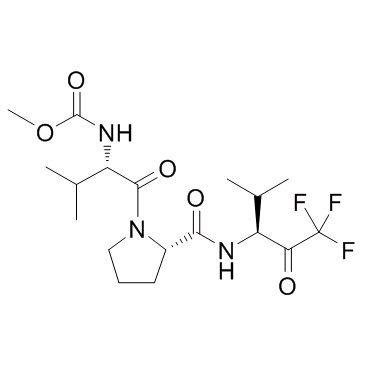| Description |
ZD8321 is a potent inhibitor of human Neutrophil elastase (NE) with a Ki of 13±1.7 nM.
|
| Related Catalog |
|
| Target |
Ki: 13±1.7 nM (Neutrophil elastase)[1]
|
| In Vitro |
TNFα-activated HUVEC is dose dependently inhibited by ZD8321.The adhesion between cancer cells with high elastase activity and TNFα-activated HUVEC is also inhibited by ZD8321. Expression of cell surface E-selectin by NE stimulation is suppressed in the presence of ZD8321. The concentration of soluble E-selectin in the medium increases after adhesive reaction between neutrophils and HUVEC. This increase is also dose dependently inhibited by ZD8321[2].
|
| Cell Assay |
HUVECs are cultured in RPMI 1640 containing 5% FBS for 6 h in collagen-coated, 24-well plates before the experiment. Some of the confluent HUVECs are further incubated with TNFα (1 ng/mL) and ZD8321 (0-50 mM), or with human NE (0-100ng/mL) for 4 h at 37°C. For adhesion assays, cancer cells resuspended in RPMI 1640 containing 5% FBS are added to each HUVEC-layered well. The plates are shaken at 700 rpm for 10 min at room temperature, washed twice with PBS, and examined by phase-contrast microscopy to determine the number of cells bound onto the HUVEC monolayer. The adhesive reactions of neutrophils to HUVEC are also analyzed in this manner[2].
|
| References |
[1]. Veale CA, et al. Orally active trifluoromethyl ketone inhibitors of human leukocyte elastase. J Med Chem. 1997 Sep 26;40(20):3173-81. [2]. Nozawa F, et al. Elastase activity enhances the adhesion of neutrophil and cancer cells to vascular endothelial cells. J Surg Res. 2000 Dec;94(2):153-8.
|
